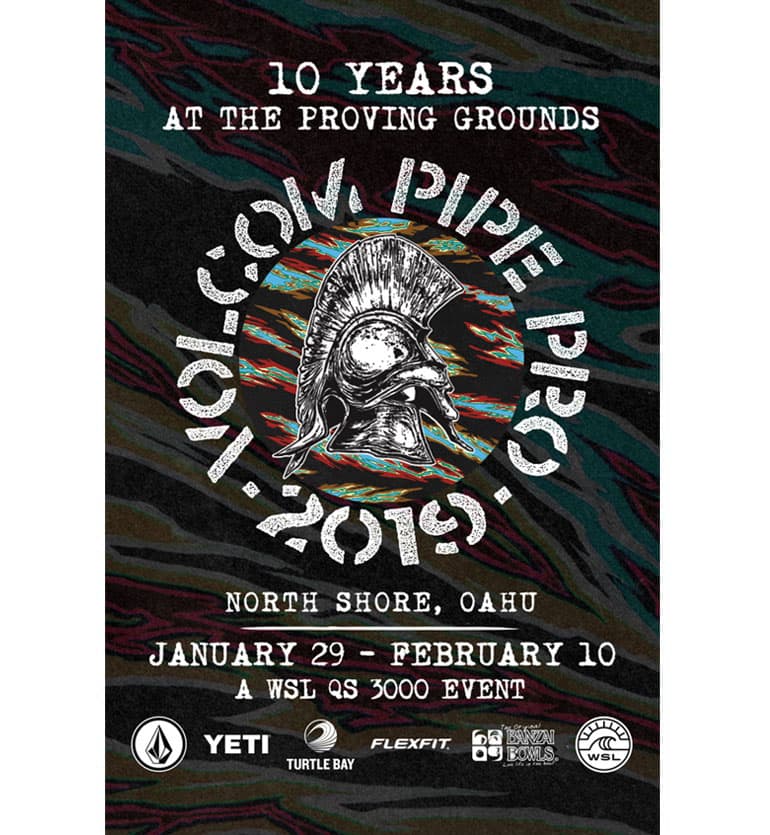Volcom Pipe Pro - A Deep Blue Surfing Event
Since 2013, the annual Volcom Pipe Pro surf contest on the North Shore of Oahu, Hawaii, has been designated a Deep Blue Surfing Event.
What does it mean to be a designated Deep Blue Surfing Event?
Working with Sustainable Surf, Volcom runs a world-class professional surfing event that’s ocean-friendly and sets a clear path for reducing its environmental and community impacts.
Each year sustainability report is produced that provides a transparent description of the sustainability performance of the event, and includes measured data, photos and videos, and suggestions for improvement. Deep Blue Surfing Events specifically address impacts directly related to the local contest area, including waste reduction, protection of natural resources, and the building of stronger communities.
To receive a Deep Blue Surfing Event designation, an event is required to reduce environmental and social impacts of the event, and develop a data collection plan to measure performance on impact reduction. The resulting data must show that the event has met the minimum goals for at least two of the five major categories of environmental and social impacts.
- Waste Diversion Goal: Implement a comprehensive management and diversion strategy to limit event waste. Minimum goal is 25% of total event waste is diverted from landfill.
- Renewable Energy Goal: Source significant portion of power from clean, renewable energy sources. Minimum goal is 25% renewable energy utilization for event’s power needs.
- Climate Change Goal: Calculate the total CO2 footprint of event, and mitigate it by purchasing verified carbon offset credits or otherwise through direct actions taken at event. Minimum goal is 50% of CO2 footprint of event offset or mitigated.
- Community Support Goal: Support and showcase the efforts of local environmental and social organizations, and include them as stakeholders for possible event legacy efforts. Minimum goal is to support at least one NGO working on a local issue relevant to the event.
- Transportation Goal: Enable shuttle services, source low carbon vehicles, and encourage the use of public and alternative transportation for event spectators. Minimum goal is to provide shuttle service to and from event for event staff, and/or encourage and facilitate the use of human powered modes of transport such as biking, skateboarding and walking by local spectators.
Sustainability Performance Summary
Environmental & Social Impacts

2019
- Waste Diversion: 71% of waste diverted from landfill
- Renewable Energy: Contest powered by 100% renewable biodiesel fuel and solar electricity
- Climate Change: 100% of CO2 footprint mitigated (445 tons CO2e)
- Community Support: Supported local community organizations with more that $95,000 in donations
- Transportation: Promoted low-carbon transportation for athletes, staff, and spectators
- Food: Provide local, sustainably-sourced food and catering options for athletes and attendees

2018
- Waste Diversion: 68% of waste diverted from landfill
- Renewable Energy: Contest powered by 100% renewable biodiesel fuel and solar electricity
- Climate Change: 100% of CO2 footprint mitigated (445 tons CO2e)
- Community Support: Supported local community organizations with more that $60,600 in donations
- Transportation: Promoted low-carbon transportation for athletes, staff, and spectators

2017
- Waste Diversion: 66% of waste diverted from landfill
- Renewable Energy: Contest powered by 100% renewable biodiesel fuel and solar electricity
- Climate Change: 100% of CO2 footprint mitigated (359.7 tons CO2e)
- Community Support: Supported local community organizations with more that $100,000 in donations
- Transportation: Promoted alternative transportation for athletes, staff, and spectators

2016
- Waste Diversion: 74% of waste diverted from landfill
- Renewable Energy: Contest powered by 80% renewable biodiesel fuel and solar electricity
- Climate Change: 100% of CO2 footprint mitigated (337 tons CO2e)
- Community Support: Supported local community organizations with $68,000 in donations
- Transportation: Promoted alternative transportation for athletes, staff, and spectators

2015
- Waste Diversion: 65% of waste diverted from landfill
- Renewable Energy: Contest powered by 80% renewable biodiesel fuel
- Climate Change: 100% of CO2 footprint mitigated (360 tons CO2e)
- Community Support: Supported local community organizations with $79,000 in donations
- Transportation: Promoted alternative transportation for athletes, staff, and spectators

2014
- Waste Diversion: 82% of waste diverted from landfill
- Renewable Energy: Contest powered by 60% renewable biodiesel fuel
- Climate Change: 100% of CO2 footprint mitigated (259 tons CO2e)
- Community Support: Supported local community organizations with $60,000 in donations
- Transportation: Promoted alternative transportation for athletes, staff, and spectators

2013
- Waste Diversion: 65% of waste diverted from landfill
- Renewable Energy: Contest powered by 80% renewable biodiesel fuel
- Climate Change: 100% of CO2 footprint mitigated (280 tons CO2e)
- Community Support: Supported 5 local community organizations
- Transportation: Promoted alternative transportation for athletes, staff, and spectators

Watch Michael Stewart, the founder of Sustainable Surf, sit down with Sal Masekela for an interview during the 2017 Volcom Pipe Pro to discuss sustainability efforts over the past five years at the Volcom Pipe Pro.








 Back
Back